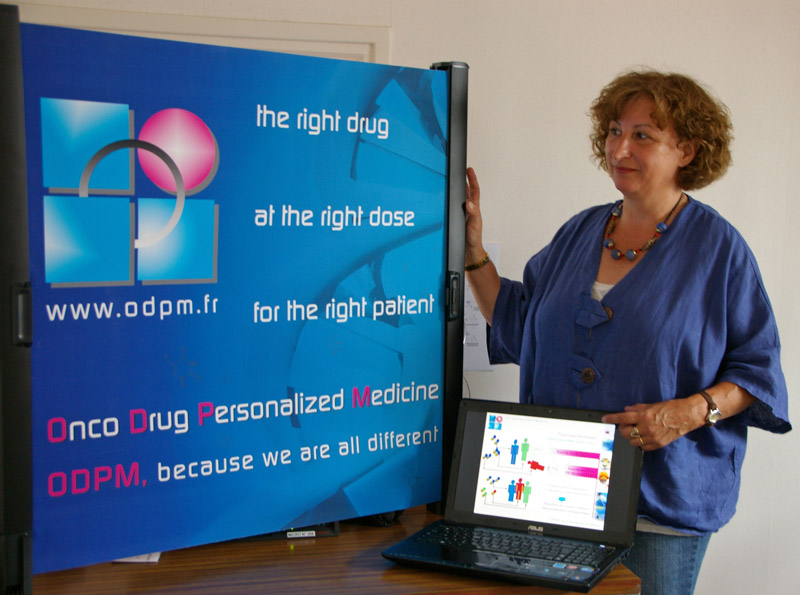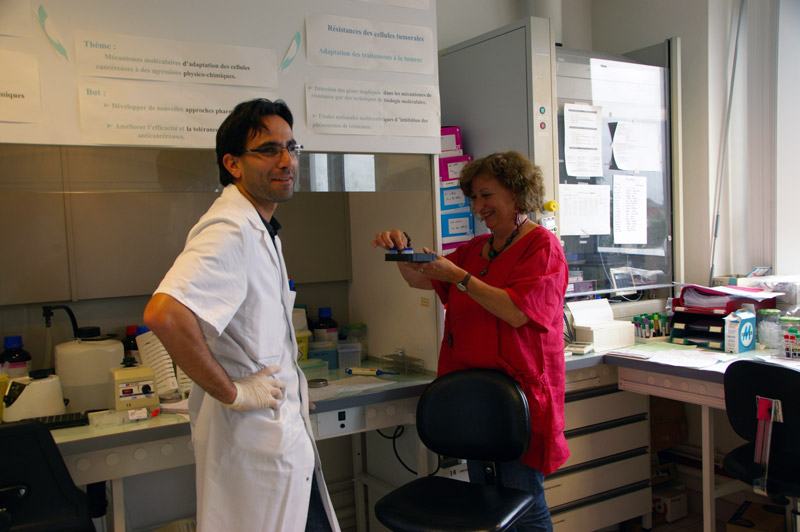Michèle Boisdron-Celle
Michèle Boisdron-Celle is a biologist and pharmacologist whose scientific credentials speak for themselves: a doctor of pharmaceutical sciences, she has spent 16 years at the Paul Papin Cancer Institute in Angers, France, where she created an oncopharmacology unit to study anti-cancer drugs, and in 2006 founded the Tumours Biopathology Department, overseeing a team of 30 biologists, pharmacists and technicians. Two years ago, she co-founded Onco Drug Personalized Medicine (ODPM), a medical-science start-up with a mission to bring to market the fruit of 15 years’ research, which she believes will improve therapy and quality of life for millions of cancer patients undergoing chemotherapy.
Chemotherapy is a treatment both welcomed and feared, since it combats the disease by pumping the body with toxic substances to kill cancer cells. ‘Its toxicity is rightly deemed an ill for a good despite its unpleasant side effects,’ says Michèle, ‘since it can help bring cancer into remission. In certain cases its ill effects can be dramatic, however, and in very rare instances lead to death.’ The mortality ratio for toxicity to colorectal cancer treatment is three per one thousand, for example; for a doctor whose patient is one of those three, that’s one too many, says Michèle. ‘Some cancer treatment involves a course of “preventive” chemotherapy when the patient is in remission, to keep vicious cancer cells at bay. If the drugs administered should lead to death instead of cure, it’s a terrible tragedy for the family.’
Easing the pain
To find a way to manage toxicity, for the past 15 years Michèle and oncologist Erick Gamelin – one of ODPM’s co-founders along with molecular biologist Alain Morel – have tested the effects of fluorouracil, or 5-FU, a chemotherapy drug used to treat colorectal, breast, stomach and oesophagus cancers. Toxic side effects in their mildest forms include nausea, fatigue and hair loss; more serious cases cause profuse diarrhoea, which can lead to dehydration and even coma, and a sharp decrease in white blood cells, exposing the patient to viruses and bacteria.
‘Chemotherapy works by targeting fast-growing cancerous cells, but makes no distinction between sick cells and healthy fast-growing cells, such as blood cells, the cells in the hair follicles and in the stomach,’ Michèle explains. For the past 50 years, dosages have been evaluated in relation to the patient’s height and weight. ‘This leaves some crucial considerations aside. Each person has their own capacity to eliminate drugs more or less effectively, linked to their genes and metabolism. Without testing, the oncologist doesn’t know if the patient will react badly until the first symptoms appear.’
Personalised solutions
To solve this issue, ODPM has created tools to analyse genetic and metabolic characteristics – known as genotyping and phenotyping – combined with powerful algorithms to calculate and evaluate toxicity risk: ODPM Tox comprises three kits to analyse bloodwork for genotype, phenotype and other patient characteristics in relation to 5-FU toxicity, plus access to online algorithms which compute the data and determine the best dosage. ODPM Protocol offers online access to calculations that monitor an individual’s chemotherapy treatment to ensure optimal doses of 5-FU.
‘Current dosage methods create three problem scenarios,’ says Michèle. ‘Some patients eliminate fast and can receive doses that are too low, which can make chemotherapy less effective, others eliminate slowly and can receive excessive doses that may spark a toxic reaction; others still cannot eliminate the drug at all and should be considered for other drugs or treatment. ODPM’s solutions optimise therapy, improve patient care and lower the risk of further treatment to handle the toxicity with the costs that entails.’ The last word remains with the oncologist, of course, who receives the reports and analyses their conclusions.


